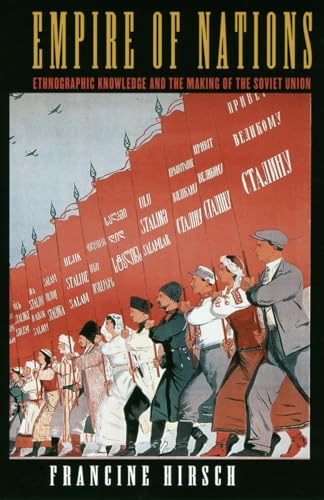Empire of Nations
Ethnographic Knowledge and the Making of the Soviet Union (Culture and Society after Socialism)
Francine Hirsch
BOOK REVIEW

In a world inundated with narratives of individual heroes and triumphs, Empire of Nations: Ethnographic Knowledge and the Making of the Soviet Union propels you into the bureaucratic labyrinth that forged an entire society. Francine Hirsch examines the sprawling Soviet Union through the lens of ethnography, unearthing the intricate web of knowledge that underpinned a state construction marked by ambition, ideology, and a relentless quest for identity. This book does not merely recount facts or present historical data; it invites you to dive into the visceral power struggles and human experiences that defined a nation's fabric, making it an exhilarating and thought-provoking read.
Hirsch's meticulous research reveals how ethnographic practices were not merely academic exercises; they became instruments of statecraft. Throughout the Soviet regime, ethnographers were tasked with categorizing nations and peoples in a manner that served to solidify the authority of the Kremlin. Each study, each survey, and each map produced were pieces in a larger puzzle aimed at consolidating power. This text stirs a maelstrom of emotions, as you confront the weight of misappropriated knowledge and its consequences. The book's essence lies in how these classifications contributed to a distorted sense of unity, overshadowed by the state's manipulative ambitions.
Reflecting on the historical context in which Hirsch operates, the reader is forced to grapple with the specters of colonialism and nationalism that pervaded the 20th century. The Soviet Union's tactics were not unique; they echoed throughout the annals of history, quite like today's waves of nationalism that continue to rise in various forms around the globe. Could it be that the echoes of Hirsch's findings resonate today as we navigate our own polarized societies? As you turn the pages, this question lingers like smoke in a darkened room, imploring you to confront contemporary parallels.
The depth of Hirsch's analysis ignites a furious debate among readers. Some laud her for peeling back the layers of a complex historical narrative, while others criticize the book for what they perceive as overemphasis on structuralism and the theoretical. Yet, the contentious reviews only bolster its appeal. It's a sparring ground where passionate opinions clash, and you, dear reader, are thrust into the center of this intellectual arena-how do you perceive the balance of state versus identity formation? Is nation-building an act of creation or subjugation?
Hirsch's narrative is rich, textured, and evocative. She deftly intertwines archival research with poignant storytelling, allowing the voices of those silenced to resonate once more. You can almost taste the suffocating atmosphere of oppression as you learn how many were coerced into compliance under the guise of national unity. The oppressive weight of this state-led ethnography fosters an empathetic understanding of how identity is negotiated and constructed.
Moreover, Hirsch casts a spotlight on the inherent ruthlessness of state propaganda, leading us to question the reliability of knowledge produced for political ends. Such realizations rattle us awake, imploring a reconsideration of how history, even in its most academic forms, can be wielded as a weapon. The understanding that ethnographic knowledge wasn't merely passive documentation but an active participant in the political game is both astounding and horrifying.
With Empire of Nations, you are not just embarking on an academic journey; you're traversing a labyrinthine realm where knowledge and power intertwine in a dance as old as civilization itself. This book evokes a haunting sense of urgency; it speaks to the heart of what it means to belong to a nation-a theme that echoes universally. Hirsch's work unveils the unsettling connections between identity, knowledge, and state power that persist in today's world, leaving you with more questions than answers.
So, as you come away from this narrative, it becomes impossible not to rethink the constructs of your own identity, spurred on by the unsettling parallels drawn throughout history. Prepare to be astounded: the foundations of nations are often built on the shifting sands of perception and ideology. This isn't merely a book; it's a mirror reflecting our world back at us, with all its complexities and contradictions laid bare. 🌍
📖 Empire of Nations: Ethnographic Knowledge and the Making of the Soviet Union (Culture and Society after Socialism)
✍ by Francine Hirsch
🧾 392 pages
2005
#empire #nations #ethnographic #knowledge #making #soviet #union #culture #society #after #socialism #francine #hirsch #FrancineHirsch